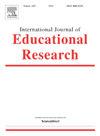Tracing the footprints of returning international students in Pakistani context: A capability approach analysis
IF 2.6
3区 教育学
Q1 EDUCATION & EDUCATIONAL RESEARCH
引用次数: 0
Abstract
The internationalization of higher education has been attracting a large number of students from the South to the North. Though no consolidated data is available, one can safely say that the trend is on the rise with fast-paced globalization, increased information flows, and the availability of international scholarships. While several international students settle abroad after the completion of their studies, a large number also return home for one reason or the other. This is a pertinent moment then to explore the societal implications of returning international students, given the slim literature available in this area, especially in South Asian contexts. This paper shares some findings from a study involving 22 returning international students to understand the societal impacts of their return to Pakistan. The study was qualitative, with in-depth interviews as the main instruments. Drawing on Amartya Sen's capability approach, the aim was to capture the nature of individual capability expansion following international educational experience and implications for the home country when they return. The findings revealed that individuals made valuable tangible and intangible contributions to their home country in multiple dimensions. However, the individual agency freedoms and achievements of the returnees were interlinked with the expansion of collective agency and achievements. This in turn set off another cycle of individual and collective capability expansion. These agency achievements were, nevertheless, filtered by social-cultural factors of class, social capital, institutional structures, and the symbolic value attributed to Western knowledge; the latter resulting also in some capability deprivation.
追踪巴基斯坦背景下归国留学生的足迹:能力方法分析
高等教育的国际化已经吸引了大量的学生从南方到北方。虽然没有统一的数据,但可以肯定地说,随着全球化的快节奏、信息流的增加以及国际奖学金的提供,这一趋势正在上升。虽然有一些国际学生在完成学业后定居在国外,但也有很多人因为这样或那样的原因回国。鉴于这一领域的文献很少,尤其是在南亚地区,现在是探讨留学生归国的社会影响的恰当时机。本文分享了一项涉及22名回国留学生的研究的一些发现,以了解他们返回巴基斯坦的社会影响。本研究为质性研究,以深度访谈为主要工具。借鉴Amartya Sen的能力方法,其目的是捕捉国际教育经历后个人能力扩展的本质以及他们回国后对母国的影响。调查结果显示,个人在多个方面为他们的祖国做出了宝贵的有形和无形的贡献。但是,回返者的个人能动性自由和成就与集体能动性和成就的扩大是相互联系的。这反过来又引发了个人和集体能力扩张的另一个循环。然而,这些代理成就被阶级、社会资本、制度结构和归因于西方知识的象征价值等社会文化因素过滤了;后者也导致了一些能力的剥夺。
本文章由计算机程序翻译,如有差异,请以英文原文为准。
求助全文
约1分钟内获得全文
求助全文
来源期刊

International Journal of Educational Research
EDUCATION & EDUCATIONAL RESEARCH-
CiteScore
6.20
自引率
3.10%
发文量
141
审稿时长
21 days
期刊介绍:
The International Journal of Educational Research publishes regular papers and special issues on specific topics of interest to international audiences of educational researchers. Examples of recent Special Issues published in the journal illustrate the breadth of topics that have be included in the journal: Students Perspectives on Learning Environments, Social, Motivational and Emotional Aspects of Learning Disabilities, Epistemological Beliefs and Domain, Analyzing Mathematics Classroom Cultures and Practices, and Music Education: A site for collaborative creativity.
 求助内容:
求助内容: 应助结果提醒方式:
应助结果提醒方式:


